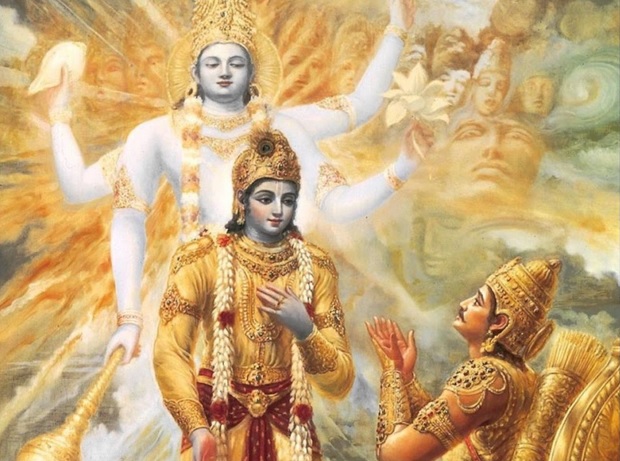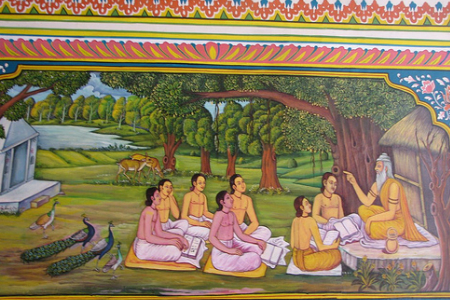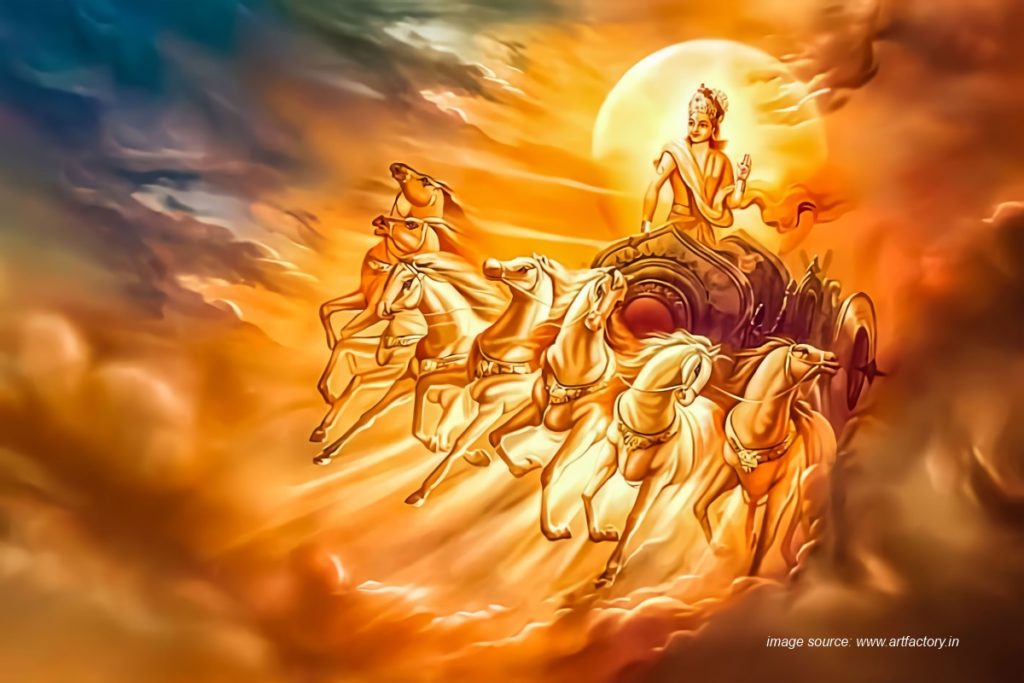So far, we’ve journeyed through Bhagavad Gita chapters 1, 2, and 3, where Lord Krishna imparted profound wisdom on life, duty, and spirituality. He stressed the importance of selflessly fulfilling prescribed duties (swadharma) and detaching from outcomes. Lord Krishna highlighted self-realization and the eternal soul (atma), emphasizing that true knowledge and spiritual growth stem from discernment, self-control, and mastering desires and senses. These chapters guide us to lead purposeful, spiritually conscious lives, harmonizing worldly responsibilities and inner wisdom.
Let’s now start with Chapter 4 – Jnana Yoga – The Yoga of Knowledge
Chapter 4, Verse 1:
एवं परम्पराप्राप्तमिमं राजर्षयो विदुः।
स कालेनेह महता योगो नष्टः परन्तप।।
evaṁ paramparā-prāptam imaṁ rājarṣhayaḥ viduḥ
sa kāleneha mahatā yogaḥ naṣhṭaḥ parantapa
English Translation:
The Supreme Lord said: I taught this eternal science of yoga to the sun-god, Vivasvan, who then instructed it to Manu, the father of mankind, and Manu in turn instructed it to Ikshvaku.
Commentary:
In the Bhagavad Gita, Lord Krishna reveals the ancient lineage of yogic knowledge, tracing it back to the very beginning of time. He explains that he imparted this timeless wisdom to the sun-god, Vivasvan, who then passed it on to Manu, the forefather of humanity. Manu then passed it on to Ikshvaku, the founder of the Ikshvaku dynasty. This unbroken lineage of sages and teachers has preserved the sanctity of yogic knowledge, underscoring its everlasting nature and profound significance.
In Chapter 3 of the Bhagavad Gita, Lord Krishna emphasizes the importance of karma yoga for those who aspire for moksha, or liberation from the cycle of birth and death. Karma yoga is the path of selfless action, performed without attachment to the fruits of one’s actions.
Lord Krishna explains that even if one’s quest is for knowledge, the path to liberation remains the same: fulfilling one’s duties (swadharma) without harboring expectations of personal rewards.
It is noteworthy that the eternal wisdom of yoga was not first spoken on the battlefield of Kurukshetra. Lord Krishna had imparted this profound knowledge to Manu, the progenitor of humankind, over 120 million years ago.
Throughout Chapter 4 of the Bhagavad Gita, Lord Krishna continues to emphasize the significance of karma yoga. He elucidates its essence and provides guidance on how to practice it effectively.
Chapter 4, Verse 2:
स एवायं मया तेऽद्य योगः प्रोक्तः पुरातनः।
भक्तोऽसि मे सखा चेति रहस्यं ह्येतदुत्तमम्।।
sa evāyaṁ mayā te’dhya yogaḥ proktaḥ purātanaḥ
bhakto’si me śhakha ceti rahasyaṁ hyetad uttamam
English Translation:
This supreme science was thus received through the chain of disciplic succession, and the saintly kings understood it in that way. But in course of time, the succession was broken, and that is why the science as it is appears to be lost.
Commentary:
Continuing from the previous verse, Lord Krishna explains that the knowledge of yoga was passed down through a sacred lineage of saintly kings and sages who understood its essence. However, over time, this chain of succession was disrupted, leading to the loss of the original teachings. This verse highlights the importance of preserving spiritual knowledge through an unbroken tradition of teacher-student transmission, emphasizing how the interruption in this tradition can result in the apparent loss of such profound wisdom.
In India, we find an enduring tradition known as guru-shishya parampara, an age-old practice where wisdom flows seamlessly from guru (teacher) to shishya (student). This tradition not only ensures the precision of teachings but also imparts contextual understanding for each specific teachings, fostering a profound sense of community among its participants.

Chapter 4, Verse 3:
अर्जुन उवाच |
अपरं भवतो जन्म परं जन्म विवस्वत: |
कथमेतद्विजानीयां त्वमादौ प्रोक्तवानिति ||
Arjuna Uvāca |
Aparaṁ bhavato janma paraṁ janma vivasvataḥ |
Kathametad vijānīyāṁ tvam ādau proktavān iti ||
English Translation:
That very same ancient science of yoga, which is an imperishable and eternal secret, I am revealing to you today because you are My devotee and My friend. This knowledge is the most profound.
Commentary:
In this verse, Lord Krishna underscores the profound nature of the timeless science of yoga. He imparts this ancient wisdom to Arjuna due to their unique relationship, grounded in devotion and friendship. Recognizing Arjuna as both His devotee and friend, Krishna deems him a worthy recipient of this sacred knowledge. This verse accentuates the significance of the deep bond between a seeker and the Divine in the transmission of spiritual wisdom, as well as the importance of the devotee’s readiness to receive such profound knowledge.
Notably, the term “secret” used in this verse isn’t indicative of selfish intent but highlights the importance of the recipient’s readiness to receive such profound wisdom. It’s akin to those moments when we acquire certain books, yet they remain untouched on our shelves for a considerable period. As a friend once wisely put it, “We may possess books, but we won’t read them until we are truly ready to absorb their wisdom. When we finally do, we are often left astounded, wondering why we hadn’t read the book sooner.”
Chapter 4, Verse 4:
श्रीभगवानुवाच |
बहूनि मे व्यतीतानि जन्मानि तव चार्जुन।
तान्यहं वेद सर्वाणि न त्वं वेत्थ परन्तप।।4.5।।
śhrī bhagavān uvācha
bahūni me vyatītāni janmāni tava cārjuna
tāny ahaṁ veda sarvāṇi na tvaṁ vetttha parantapa
English Translation:
Arjuna said: Your birth appears later, and the birth of Vivasvan, the sun god, appears earlier. How am I to understand that You instructed this knowledge to him in the beginning?
Commentary:
In this verse, Arjuna grapples with a profound inquiry concerning the divine nature of Lord Krishna and the apparent timing of His teachings. He acknowledges the historical context—Krishna’s relatively recent birth compared to the ageless Sun God, Vivasvan. This incongruity leaves Arjuna perplexed, prompting him to question how Krishna could have bestowed such profound spiritual wisdom at the dawn of creation. Arjuna’s genuine curiosity paves the way for Lord Krishna to unveil the transcendental and timeless essence of His teachings in the subsequent chapters.
Arjuna’s perplexity arises from his understanding that Lord Krishna was born to Vasudev and Devaki, whereas the Sun God has existed for eons. The apparent inconsistence between Krishna’s recent birth and His role as the spiritual guide to the ancient Sun God prompts Arjuna’s quest for clarity. This interaction beautifully exemplifies the nature of Sanatana Dharma, where even a devoted seeker like Arjuna can openly question the Supreme Lord Himself.

Chapter 4, Verse 5:
श्रीभगवानुवाच | बहूनि मे व्यतीतानि जन्मानि तव चार्जुन। तान्यहं वेद सर्वाणि न त्वं वेत्थ परन्तप।।4.5।।
śhrī bhagavān uvācha bahūni me vyatītāni janmāni tava cārjuna tāny ahaṁ veda sarvāṇi na tvaṁ vetttha parantapa
English Translation:
The Supreme Lord said: Many, many births both you and I have passed. While you have forgotten them, I remember all of them, O Parantapa (subuer of the enemies – Arjuna).
Commentary:
In this verse, Lord Krishna reveals His divine omniscience, emphasizing His remarkable capacity to recall all his past lives. This revelation highlights Lord Krishna’s timeless existence and His boundless knowledge concerning the soul’s intricate journey through countless lifetimes. While Arjuna struggles to fathom the depths of his own previous births, Krishna, as the Supreme, effortlessly possesses infinite wisdom and awareness.
While there are many parallels between the relationship of the individual soul and the Supreme Soul, God, there are also many disparities. Both share the attributes of being eternal, sentient, and blissful (sat-chit-ānand). However, there are many distinctions – God, omnipresent, pervades all, whereas the individual soul’s presence is confined to the physical body it inhabits. God’s omnipotence far surpasses the individual soul’s limited abilities, which even necessitate divine grace for liberation from maya’s (illusion) entanglement. As the creator of natural laws, God governs, while the individual soul abides by them. God sustains the entire creation, whereas the individual soul relies upon this divine support. In wisdom, God is omniscient, while the soul grapples with incomplete knowledge.
Addressing Arjuna as “Parantapa,” meaning “subduer of enemies,” Lord Krishna encourages him not to succumb to doubt. He recognizes Arjuna’s valor in conquering formidable foes on the battlefield and urges him not to be defeated by the doubt that has arisen in his mind. Instead, Krishna bestows upon Arjuna the sword of knowledge to vanquish this doubt and stand firmly in wisdom.
We will continue from Chapter 4, verse 6 next week.
ॐ पूर्णमदः पूर्णमिदं पूर्णात्पुर्णमुदच्यते
पूर्णस्य पूर्णमादाय पूर्णमेवावशिष्यते ॥
ॐ शान्तिः शान्तिः शान्तिः ॥
Om Puurnnam-Adah Puurnnam-Idam Puurnnaat-Purnnam-Udacyate
Puurnnasya Puurnnam-Aadaaya Puurnnam-Eva-Avashissyate ||
Om Shaantih Shaantih Shaantih ||
My Pranams to you!

